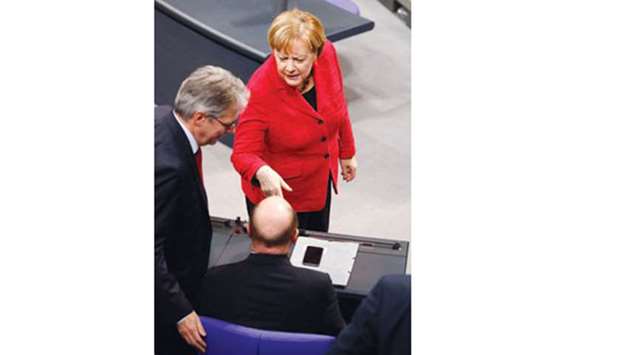The manoeuvring over how to resolve the current political impasse following September’s inconclusive election appeared to add to the unusually aggressive atmosphere pervading the Bundestag.
Lawmakers exchanged abuse with their political opponents as the Bundestag considered the serious business of a government plan for a temporary extension of Berlin’s seven overseas military missions and discussed engineering giant Siemens’ plans for mass lay-offs.
Yesterday’s sitting of the Bundestag was also the second time that the 92 members of the populist Alternative for Germany (AfD) have appeared in the chamber after their party became the first major right-wing group to enter the national parliament since World War II.
The AfD members launched into a series of often-rambling speeches about human traffickers, Islam, claims about the economic fallout from Germany’s drive to boost alternative energy and, of course, migrants and refugees, which was a key issue that helped propel the party into parliament.
Referring to the numbers of Afghans applying for asylum in Germany, AfD parliamentary leader Alexander Gauland told lawmakers: “Afghans are sitting on the Ku’Damm drinking coffee instead of helping to rebuild their country.”
The Ku’Damm refers to the Kurfuerstendamm, the tree-lined entertainment and upmarket shopping boulevard cutting through central Berlin.
“The AfD (parliamentary) faction stands for honesty and integrity,” declared AfD lawmaker Norbert Kleinwaechter, prompting laughter from other deputies, many of whom spent their time making the point of not listening to the AfD members’ speeches and instead staring into their smartphones.
But while tensions dominated proceedings on the Bundestag floor, the real political action was being played out behind the scenes as the main parties faced mounting pressure to return to the negotiating table to form a new coalition so as to avoid fresh elections.
In the meantime, members of all parties both inside and outside the Bundestag were making a series of sometimes conflicting remarks on the future of coalition talks in the nation.
The parliamentary session began with a smiling Merkel launching her own charm offensive to get the coalition talks back on track by first chatting with Free Democrat (FDP) members and then approaching a seemly-startled Social Democrat (SPD) leader, Martin Schulz.
The SPD chief has dug his heels in and refused to play along with Merkel’s hopes that Schulz’s centre-left party will agree to rejoin her coalition and head off the threat of early elections.
The FDP dropped out of coalition negotiations earlier this week.
In her speech to parliament, German Defence Minister Ursula von der Leyen called on the Bundestag to back the temporary extensions of the Bundeswehr’s overseas missions, saying that they formed a key part of ensuring the continuation of the nation’s foreign policy.
The proposed three-month extension of the military operations, including a training mission in Afghanistan, would help to give German parties time to form a new government after Sunday’s failure of coalition talks, the minister said.
After all, “Germany stands for reliability”, von der Leyen tried to reassure lawmakers.
Merkel speaking with SPD leader Schulz (seated) after she arrived for a session yesterday at the Bundestag lower house of Parliament.

